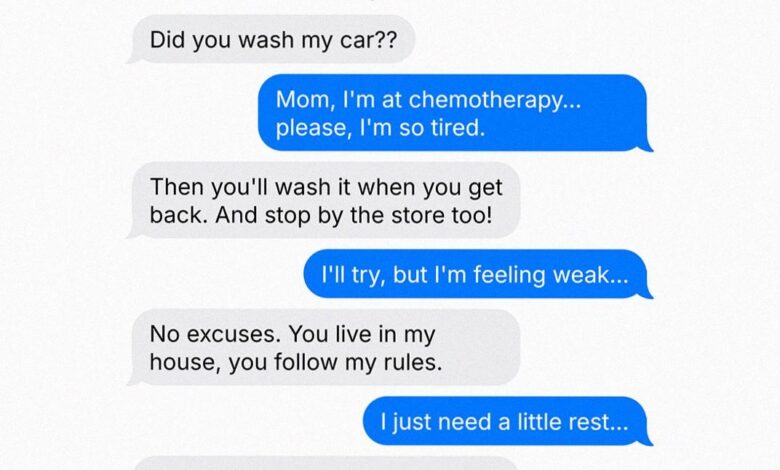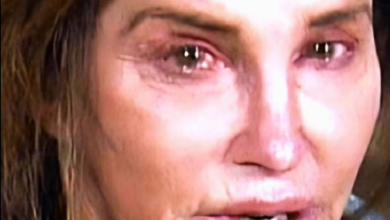
I Was Undergoing Chemotherapy, but My Mom Used Me as a Servant Since I Lived in Her House, Until My Friend Stepped In
When I was diagnosed with stomach cancer at just 24, my world collapsed in a single afternoon. One moment, I was working steadily, living in my own apartment, and enjoying the independence I had fought hard to earn. The next, I was staring at test results that shattered every plan I had for my future. Within weeks, chemotherapy became my new reality, and my life revolved around endless doctor visits, pills, and a body that no longer felt like my own.
For years before my diagnosis, I had lived far away from my mother. Our relationship had never been good. Even as a teenager, I worked multiple part-time jobs just to save enough money to get out of her house. She never nurtured me; she tolerated me, making me feel like a burden more than a daughter. The day I turned 18 and moved into a small, shabby studio apartment with a leaky faucet felt like liberation.
But cancer doesn’t care about your escape plans.
Medical bills drained my savings within months. Insurance only covered part of my treatment. The rest—co-pays, medications, special foods, transportation—came out of pocket. I tried to keep working, but the fatigue was relentless. Some days, I couldn’t get out of bed. Other days, I dragged myself to work only to vomit in the bathroom between shifts. Eventually, I had to quit. Without my income, rent became impossible, and the independence I had clung to for years slipped away. I sold my belongings, one by one, until all I had left was the choice I had dreaded most: moving back in with my mother.
I thought, foolishly, that maybe illness would soften her. Maybe my diagnosis would bridge the distance between us. I was wrong.
From the very first week, she saw me not as her sick daughter but as a live-in servant. Each morning, I woke to a handwritten list taped to the refrigerator. It wasn’t a request—it was a schedule. Sweep the kitchen. Scrub the bathrooms. Make lunch for her friends. Paint the backyard fence. Vacuum the living room. Every hour of my day was dictated by her lists, as though my diagnosis didn’t exist. On days when chemo left me too weak to stand, she dismissed my exhaustion as laziness. “Other people work through worse,” she’d sneer. “You’re not special.”
It only got worse. When I qualified for food assistance because I couldn’t work, she demanded I hand over my EBT card. “You’re too sick to shop,” she said. “I’ll manage it for you.” At first, I agreed, relieved to let someone else handle one more thing. But the groceries she brought home weren’t for me. The pantry filled with soda, chips, frozen pizza—all the things I couldn’t keep down. Meanwhile, the rice, crackers, and broth I desperately needed never appeared. When I questioned her, she brushed me off with, “Don’t be ungrateful. I buy what’s on sale.”
Even when I was at the clinic, hooked up to an IV, she texted me lists of errands: “Pick up milk and cookies on your way back. Don’t forget to vacuum. Wash my car today.” Her demands never paused, not even while poison dripped into my veins.
The breaking point came when I discovered my car was gone. I returned from chemo one afternoon and found the driveway empty. Panicked, I asked her where it was. She casually admitted she had sold it—without telling me, forging my signature in the process. “You don’t need it,” she said flatly. “I used the money for rent. Living here isn’t free.”
That car was my last shred of independence. It was how I got to treatment without begging for rides. It was proof I still had some control over my life. And she took it without hesitation.
I might have endured it all in silence if not for Mara, my closest friend. One day, she drove me home from chemo, saw the state I was in, and demanded to know the truth. I broke down and told her everything—the endless chores, the stolen food benefits, the texts, the car. Her face turned red with anger. “Lena,” she said, “this isn’t just cruel. It’s exploitation. You can’t stay here.”
When I insisted I had nowhere else to go, she cut me off. “Yes, you do. You’re coming home with me. Tonight.” And she meant it. We packed my things and left.
For the first time in months, I slept without fear of waking up to a new list taped to the fridge. Mara didn’t stop at giving me a place to stay. She urged me to report what my mother had done. I hesitated—years of emotional abuse had convinced me no one would believe me—but Mara refused to let me minimize the truth. With her by my side, I filed reports with both the police and social services.
To my shock, the authorities took me seriously. They called my mother’s actions what they were: financial exploitation of a vulnerable adult. Within weeks, social services revoked her access to my benefits, demanded repayment, and flagged her for further investigation. The car situation moved into legal proceedings as theft.
When my mother showed up at Mara’s apartment, she wasn’t remorseful. She was furious. She accused me of ruining her life, of being ungrateful for the “roof over my head.” But this time, I didn’t crumble. For the first time, I said the words she never expected to hear: “No. You don’t own me. You will face the consequences.” Mara shut the door on her shouting, and that door symbolized more than just an end to the argument. It was the end of her control over me.
Today, I’m still fighting cancer, but I’m no longer fighting alone—or under her roof. Mara gave me back more than shelter; she gave me back my dignity. My mother lost me, not because of my illness, but because she chose power and cruelty over love. And that’s something I’ll never let her take from me again.




